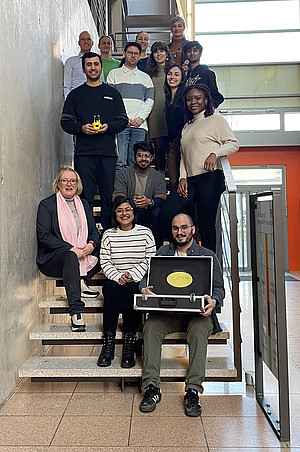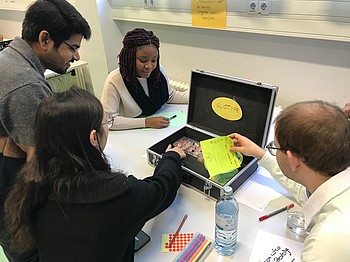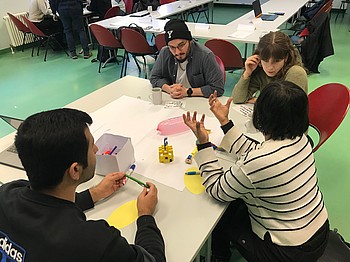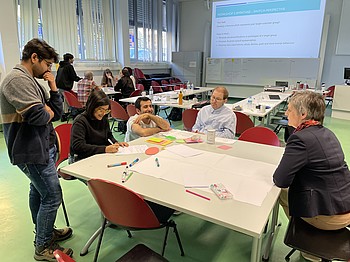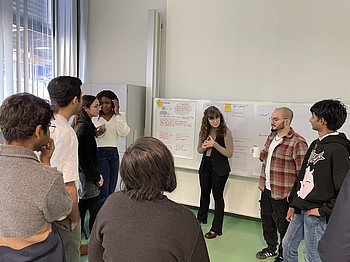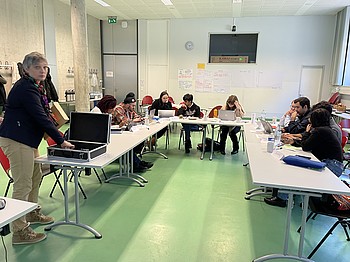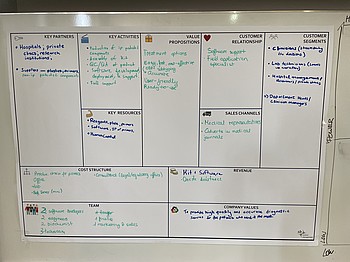Sie befinden sich hier
Inhalt
Date: 20.02.2025
On 17-19 February, the MCTN hosted an exciting Innovation Bootcamp & Equality, Diversity and Inclusion Workshop at the Mannheim Medical Faculty for the students of the GLIORESOLVE project, an EU-funded research project within the Horizon Europe programme focusing on glioblastoma.
The workshop was opened by a welcome from PD Dr. Dr. Lukas Bunse, senior physician at the Department of Neurology at the University Medical Centre Mannheim.
Throughout the Innovation Bootcamp, participating GLIORESOLVE students were guided through a structured, hands-on process from initial idea generation to the creation of an actionable business plan. Working in small, interdisciplinary teams, they were tasked with tackling real-world challenges in the field of glioblastoma (GBM) and developing innovative, science-based solutions. The bootcamp exposed the participants to critical business development methods, creativity techniques and customer engagement strategies, ensuring they gained a comprehensive and well-rounded entrepreneurial experience. By navigating the creative thinking process, students learned to approach complex problems with fresh perspectives and generate solutions that could potentially transform the GBM treatment landscape. Throughout the camp, the teams worked on two specific innovation cases. The students were also introduced to the CANVAS business model, which helped them refine their ideas and turn them into viable business concepts. Emphasis was placed on team building, where collaboration and communication were key to developing prototypes and ensuring that each solution met the needs of potential consumers. The teams were also guided through the product development process and customer surveys to validate their ideas and ensure their solutions met market needs. By the end of the bootcamp, the students had adapted their products based on consumer feedback and finalised their solutions for presentation. The groups presented their innovative approaches in short pitches. The Innovation Bootcamp, led by Dr Susanne Hollmann and Dr Christiane Gaede-Hollmann from SB Science Management - partners in the GLIORESOLVE consortium - proved to be an invaluable experience in shaping the students' entrepreneurial skills and preparing them for the future of healthcare innovation.
On the third day of the programme, students took part in an insightful Equality, Diversity and Inclusion (EDI) workshop specifically tailored to their work in neuroscience. The session began with an introduction to key concepts such as equality grounds, intersectionality and the importance of EDI in academic and healthcare settings. Students explored the complexities of discrimination, including microaggressions, privilege and different levels of racism, while also exploring the critical difference between being 'non-racist' and 'anti-racist'. There was a special focus on EDI in health care, where strategies for promoting gender equity in science were discussed, as well as a neuroscientific approach to achieving gender equity. The workshop also addressed the pyramid of discrimination and violence, highlighting the importance of bystander intervention and providing practical guidance on how students can become active bystanders to address and prevent discriminatory behaviour. Through engaging examples and interactive exercises, students were given the tools and knowledge to create more inclusive and supportive environments in their academic and professional communities. The EDI workshop was led by Jenny Duffy from the Equality, Diversity and Inclusion Unit at the Royal College of Surgeons in Ireland.
GLIORESOLVE is an EU-funded MSCA Doctoral Network under the Horizon Europe programme, focusing on glioblastoma, the most aggressive and lethal brain tumor. Launched in 2022, the project aims to train ten PhD students in innovative research disciplines to develop precision medicine therapies targeting the tumor microenvironment of glioblastoma. The consortium comprises leading European academics, clinicians, private sector, and not-for-profit partners, employing advanced methods such as multi-omics, ex-vivo 'tumor-on-a-chip' assays, computational modeling, and systems biology. The ultimate goal is to establish a new tumor microenvironment-targeting precision medicine platform for this currently incurable disease. You can read more about GLIORESOLVE on the website www.glioresolve.eu
Photo credit: Dr Alice O’Farrell I Royal College of Surgeons in Ireland

